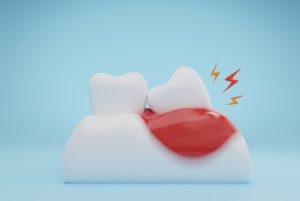A sharp burst of tooth pain can take you by surprise and instantly interrupt your day. It could be mild and fleeting, or it could feel like an electric shock radiating deep into your jaw. This is what many refer to as tooth nerve pain, and it can be caused by a number of underlying dental conditions.
Understanding what triggers this discomfort and how it can be treated is key to protecting your oral health and finding long-lasting pain relief.
What Is Tooth Nerve Pain?
Tooth nerve pain refers to discomfort that arises when the sensitive inner part of the tooth, particularly the tooth pulp and nerves inside, becomes irritated, inflamed, or damaged. Unlike surface-level tooth sensitivity, nerve pain is often intense, persistent, and difficult to ignore.

- Hot or cold foods
- Biting pressure
- Acidic foods
- Sweet substances
- Even brushing or touching the affected tooth
Inside every tooth lies the pulp, a soft centre containing blood vessels, connective tissue, and delicate nerve endings. When this area becomes exposed or infected, it can lead to severe pain and discomfort.
What’s Really Behind That Tooth Nerve Pain? Common Causes Explained
There are several reasons why your tooth’s nerve might be acting up. Let’s explore some of the most common culprits.
1. Tooth Decay (Dental Caries)
When bacteria in your mouth consume sugars, they produce acid that gradually wears down tooth enamel, the tooth’s outermost layer. If this decay isn’t addressed, it can break through the enamel and reach the pulp, leading to pain and potential nerve damage.
2. Cracked or Fractured Tooth
A cracked tooth can expose the inner layers of the tooth to external stimuli like cold food or air. Even small cracks let bacteria enter the tooth and irritate the tooth’s nerve.
3. Receding Gums
When gum tissue recedes, it exposes the sensitive roots of the teeth. Unlike the protected tooth surface covered with enamel, roots are more vulnerable to external factors, leading to dentinal sensitivity and nerve pain.
4. Gum Disease and Periodontal Disease
Advanced gum disease can affect not just the soft tissue but also the tooth roots. As inflammation spreads, it can damage the surrounding bone and nerves, causing referred pain in multiple teeth or even throughout the jaw.
5. Dental Trauma
Dental trauma can result from accidents, sports injuries, or simply biting down on something hard. The shock can damage the tooth’s nerve, sometimes without any visible crack or chip.
6. Impacted Wisdom Teeth
Wisdom teeth that are stuck beneath the gums or growing at an angle can push against neighbouring teeth, causing nerve compression and severe pain.
Symptoms You Shouldn’t Ignore
Tooth nerve pain often presents alongside additional symptoms. Spotting these early can help you address the problem before it worsens.
- Throbbing pain in an individual tooth
- Discomfort or sharp pain with hot or cold foods and drinks
- Pain that lingers even after the trigger is gone
- Swelling around the affected tooth or gums
- Pain when chewing or biting
- Visible holes or pits in the tooth surface
- Referred pain radiating to the jaw, ear, or head
- Discomfort that worsens at night
If you notice any of these symptoms, it’s time to see your dentist.
Getting to the Bottom of It: How Tooth Nerve Pain Is Diagnosed
A dental professional can determine the source of your pain using a combination of the following methods:
- Visual examination
- X-rays to check tooth roots and bone health
- Thermal testing to detect pulpal sensitivity
- Percussion tests to identify the affected area
Proper diagnosis is crucial. Not all nerve pain originates from cavities; sometimes, an issue in one tooth may cause pain in another area altogether.
Treatment Options for Tooth Nerve Pain
The right treatment option will be based on the specific cause behind the nerve irritation. Your dentist will discuss various dental procedures based on the severity of the condition.
1. Root Canal Therapy
When the pulp inside a tooth becomes irritated or infected, your dentist might suggest a root canal. This treatment involves clearing out the infected tissue, cleaning the inner portion of the tooth, and sealing it to block future infection. Root canal therapy is a widely used solution for relieving pain and preserving the natural tooth.
2. Dental Fillings
For mild tooth decay, a filling may be enough to safeguard the nerve. The decayed part of the tooth is removed and replaced with a suitable material, restoring both strength and function.
3. Tooth Extraction
When a tooth is severely damaged or the nerve cannot be saved, extraction might be the only viable treatment option. This is often the case with impacted wisdom teeth or teeth with extensive fractures.
4. Dental Crowns
Following a root canal or when a tooth is badly decayed, your dentist may suggest placing a crown to reinforce and protect the remaining tooth structure.
5. Professional Cleanings and Gum Treatment
If receding gums or gum disease is the cause, professional cleanings and periodontal treatment can help manage inflammation, protect the tooth roots, and reduce pain.
At-Home Remedies to Reduce Pain
While these do not replace professional treatment, they can provide short-term pain relief:
- Cold Compress: Placing a cold compress on the cheek can minimise swelling and numb the pain.
- Salt Water Mouth Rinse: Rinsing with warm salt water helps cleanse the mouth and reduce inflammation in the gums.
- Clove Oil: This natural remedy contains eugenol, a compound with analgesic and antibacterial properties.
- Over-the-counter pain relievers, like ibuprofen, can help ease discomfort and reduce inflammation around the affected tooth.
- Avoiding Triggers: Try to steer clear of cold foods, sugary drinks, and acidic foods until the issue is resolved.
When Should You See a Dentist?
If your tooth pain is:
- Persistent
- Worsening over time
- Interfering with your ability to eat, sleep, or focus throughout the day
- Accompanied by swelling or fever
Then, it’s time to contact your dentist. Early treatment can prevent nerve damage, save the affected tooth, and protect your overall oral health.
What Happens If It’s Left Untreated?
Ignoring tooth nerve pain can have serious consequences:
- Worsening infection: Bacteria can spread from the tooth pulp to the surrounding bone and tissues.
- Tooth loss: Advanced decay and nerve damage may lead to tooth extraction.
- Spread of infection: In rare cases, untreated dental infections can enter the bloodstream, becoming life-threatening.
- Increased dental costs: Delaying treatment often leads to more complex and expensive procedures down the road.
Preventing Tooth Nerve Pain in the Future
The good news? Tooth nerve pain is often preventable with the right care. Here’s how to protect your teeth and their delicate nerves:
- Brush your teeth twice a day using a soft-bristled toothbrush and fluoride toothpaste to keep your teeth and gums healthy.
- Floss daily to remove plaque and trapped food from between your teeth, helping to maintain healthy gums and prevent decay.
- Limit acidic and sugary foods, which can wear down tooth enamel.
- Use a mouthguard during sports to avoid dental trauma.
- Attend regular dental check-ups and professional cleanings.
- Treat cavities early before they reach the tooth nerve.
- Address teeth grinding or jaw clenching, which can crack teeth and expose nerves.
Understanding Nerve Endings and Pain Sensitivity
The nerves inside your teeth are extremely sensitive. Even small stimuli like a sip of cold water can trigger a big reaction when the enamel is compromised. These nerve endings sit close to the tooth root and pulp, which is why pulpal sensitivity can feel so intense and sometimes unpredictable.
In some cases, what seems like a small issue on the tooth surface can lead to deep nerve pain if the problem reaches the inner structures.
Tooth Pain or Something Else? Understanding Referred Pain
Sometimes, nerve pain in your teeth is not caused by the tooth itself. Referred pain can originate from other areas, such as:
- Jaw muscles
- Sinuses
- Ears
- Neck or jaw joints
This is why seeing a dental professional is so important. A thorough examination can determine whether the pain is truly coming from a tooth or from surrounding tissues.
 Wisdom Teeth and Nerve Pain
Wisdom Teeth and Nerve Pain
Impacted wisdom teeth can compress surrounding nerves, causing severe pain not only at the site but also in the jaw, ear, or throat. These teeth often do not erupt properly and can cause infections, gum disease, or crowding, leading to discomfort and even nerve involvement in neighbouring teeth.
Tooth extraction may be recommended to resolve impacted wisdom teeth and alleviate pressure on nearby nerves.
Final Thoughts: Take Nerve Pain Seriously
Tooth nerve pain is your body’s way of telling you something is wrong. Whether it’s tooth decay, a cracked tooth, or an infected pulp, early detection and treatment are crucial. From root canals to dental crowns, there are effective solutions available to stop the pain and restore your oral health.
Don’t wait for the pain to become unbearable. Book a dental visit today at (08) 7078 8263 to explore your treatment options, and take proactive steps to care for your teeth and gums.
Your smile and your comfort are worth it.
Note: Any surgical or invasive procedure carries risks. Before proceeding, you should seek a second opinion from an appropriately qualified health practitioner.
References
- Cleveland Clinic. (n.d.). Root canal. https://my.clevelandclinic.org/health/treatments/21759-root-canal
- Healthline. (n.d.). Tooth extraction. https://www.healthline.com/health/tooth-extraction
- Colgate. (n.d.). Clove oil for toothache pain. https://www.colgate.com/en-gb/oral-health/dental-emergencies-and-sports-safety/clove-oil-for-toothache-pain#:~:text=Clove%20oil%20could%20be%20the,your%20mouth%2C%20offering%20temporary%20relief.&text=When%20you%20use%20clove%20oil,clove%20oil)%20that%20provides%20relief
- Mayo Clinic. (n.d.). Bruxism (teeth grinding). https://www.mayoclinic.org/diseases-conditions/bruxism/symptoms-causes/syc-20356095



 Wisdom Teeth and Nerve Pain
Wisdom Teeth and Nerve Pain